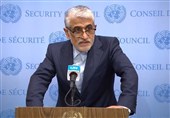Israel Constructs New Logistical Supply Routes near Rafah Crossing
TEHRAN (Tasnim) – Satellite imagery captured between May 3 and 11 reveals significant activity east of the Rafah crossing, including the demolition of structures and the establishment of new logistical routes by Israeli forces towards Rafah.
Israeli forces have visibly constructed two logistical supply roads during this period. The primary route links the Karem Abu Salem (Kerem Shalom) military site to the Rafah land crossing, spanning approximately 3.5km (2 miles) and running within 300 meters (984 feet) of the Philadelphi Corridor, situated between the Egypt and Gaza borders. The completion of this route is evident in images taken on May 11.
Additionally, the images depict the construction of a secondary road connecting the Amitai military base to the north of Rafah. Furthermore, there is evidence of bulldozing and destruction of structures and land located approximately 600 meters (984 feet) from the Philadelphi axis.
The UN's food agency has ceased food aid distributions in southern Rafah since May 11 due to depleted stocks. While food deliveries continue in Khan Younis and Deir el-Balah, they are being conducted on a limited scale. The suspension of aid in Rafah follows earlier warnings from the World Food Programme regarding dwindling food and fuel supplies throughout Gaza, attributed to Israeli restrictions at the Rafah-Egypt border crossing and limited imports via the Karem Abu Salem crossing from Israel.
Israeli military has also been ramping up attacks in Jabalia refugee camp every single hour. Recent hours have seen a notable surge in bombardment targeting not only residential structures but also the camp's central market, reflecting the densely populated nature of the area.
Israeli airstrikes, including drone attacks, have inflicted casualties, including injuries to civilians and medics. The military operations have extended to ground incursions, with fierce gun battles reported between Israeli soldiers and Palestinian fighters. The situation remains volatile, with civilian casualties mounting, including fatalities resulting from israeli strikes on residential properties.
The have also been reports of casualties among medical personnel and civilians, as Palestinian resistance groups said to have carried out numerous attacks on Israeli forces.
On Wednesday, Israeli tanks and troops pushed deep into densely populated neighborhoods of Jabalia, encountering fierce resistance, as Israeli jets frequently raided parts of the city. One Israeli strike hit a family home, killing at least four people in addition to causing injuries, according to Wafa news agency.
An Israeli military attack has hit an ambulance from Jabalia’s al-Awda Hospital, injuring at least two paramedics, according to our colleagues on the ground.
The report comes as heavy fighting continues in Jabalia, where tens of thousands of civilians have fled since Saturday.
Yesterday, a Palestinian nurse was among those killed by gunfire in the city, adding to more than 500 health professionals killed in Gaza during the war.
The International Rescue Committee (IRC) says it is facing “significant disruptions to its humanitarian operations” following Israel’s ground operations in Rafah, southern Gaza, which resulted in the closure of the Rafah crossing and a blockade on entry of humanitarian workers and aid.
Kiryn Lanning, IRC team lead for the occupied Palestinian territory, said: “I have recently returned from Gaza, where the scale of the crisis defies imagination. Facilities across southern Gaza have been repurposed into makeshift shelters overflowing into the streets. This displaced population is now facing acute shortages of basic necessities such as food, water, and adequate sanitation.”
The humanitarian situation worsens, with disruptions to aid operations reported following Israeli ground operations in Rafah. The closure of the Rafah crossing exacerbates existing shortages of essential supplies, leaving displaced populations in dire need of assistance.






